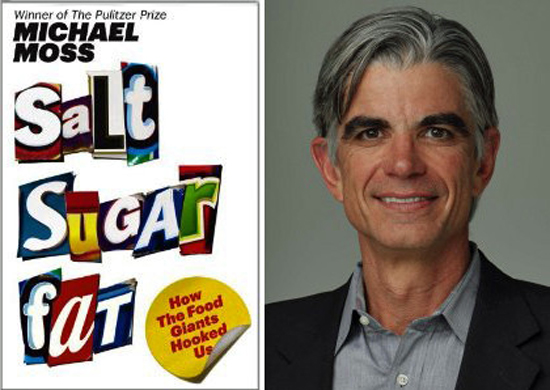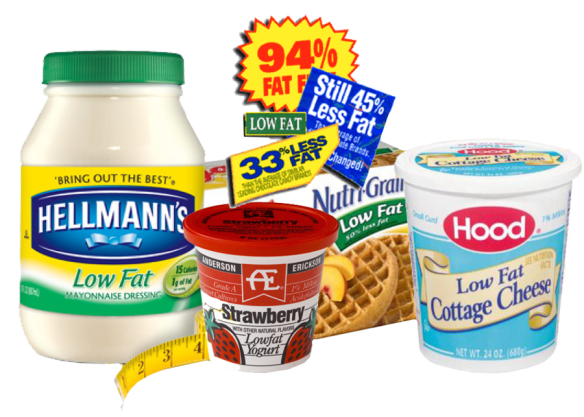
Food companies understand that salt, sugar and fat “are their holy grail.”
By Morgan Korn on Yahoo’s Daily Ticker
According to Michael Moss, the Pulitzer prizing-winning reporter and author of the new book Salt Sugar Fat: How the Food Giants Hooked Us, executives at the major food behemoths – Kraft, General Mills and Nestle – have known for years that the sugar, salt and fat added to their cereals, soups, tomato sauces and hundreds of other food products have put millions of individuals’ health at risk…

Unfortunately, the quest for bigger profits and a larger share of the consumer market has compelled the processed food industry to turn a blind eye to the dangers and consequences of eating those very products.
Moss’ book exposes the inner workings of the food industry and details how these food giants spend millions of dollars to make the food we eat more addictive. After reading his book, which took Moss four years to write and report, one may never want to consume another Cheez-It cracker or Lunchable again.
 Graphic courtesy of the Institute of Food Technologists
Graphic courtesy of the Institute of Food Technologists
How do the food giants trick consumers? Moss gives several examples:
- “At Cargill, scientists are altering the physical shape of salt, pulverizing it into a fine powder to hit the taste buds faster and harder, improving what the company calls its ‘flavor burst.'”
- “Scientists at Nestle are currently fiddling with the distribution and shape of fat globules to affect their absorption rate and, as it’s known in the industry, ‘their mouthfeel.'”
- “To make a new soda that is guaranteed to create a craving, it requires scientists employ the high math of regression analysis and intricate charts to plot what industry insiders call the “bliss point” – namely, the precise amount of sugar (or fat) that will send consumers over the moon.”

Even though consumers may think food companies are trying to help their waistlines by offering “low fat” or “low sodium” items, that’s not actually the case. Companies will add extra sugar to “low fat” products and “low sodium” offerings tend to have both higher quantities of sugar and fat.
Moss says the food companies profiled in his book understand that salt, sugar and fat “are their pillars, their holy grail.” These companies employ cadres of scientists “who specialize in the senses” and the industry “methodically studies and controls” the use of salt, sugar and fat.

Salt, sugar and fat are the foundation of processed food
Processed foods are designed “to make people feel hungrier,” Moss writes. In essence, “the processed food industry has helped foster overconsumption.”
As a result, rising obesity rates have become a global problem. In the U.S. alone, two-thirds of adults are either obese or overweight. The Centers for Disease Control estimate that nearly half of American adults will be obese by 2030. One in six American children is obese today.
Although overeating and lack of exercise are often blamed for weight gain, cheap food and the general convenience and availability of it have also contributed to the obesity crisis.
Moss provides startling evidence of just how much food people are consuming these days:
- The average American eats 33 pounds of cheese every year. That’s triple what we ate in 1970.
- Americans ingest 8,500 milligrams of salt a day: double the recommended amount.
- We consume 71 pounds of caloric sweeteners each year, equivalent to 22 teaspoons of sugar per person, per day.
The addiction to salt and sugar does not end with consumers. The food giants’ “relentless drive” to reach maximum profits at the lowest possible cost has given these companies no incentive to use real, wholesome ingredients. Sugar, for example, not only sweetens but “replaces more costly ingredients, like replacing tomatoes in ketchup to add bulk and texture,” according to Moss.
“It costs more money to use real herbs and spices,” Moss says. “Economics drive companies to spend as little money as possible in making processed foods. That’s the dilemma.”
 Food executives need to seriously start examining the consequences of their actions.
Food executives need to seriously start examining the consequences of their actions.
“They’re coming under increasing pressure from consumers,” Moss argues. “We care more and more about what we’re putting into our mouths and bodies. The food industry is… where tobacco was in the 1990s – at the verge of losing the public trust. That’s a very dangerous spot for the food industry to be in.”
Watch the interview video with Michael Moss here >
Read an article about obesity in America here >
—
© GMO-Awareness.com, 2011. Unauthorized use and/or duplication of this material without express and written permission from this blog is strictly prohibited. Excerpts and links may be used, provided that full and clear credit is given to GMO-Awareness.com with appropriate and specific links back to the original content.



This is absolutely true and it seems horrific but we live in a world of competition that is driven by money. If we really ponder what the predictable outcomes would be of such a system as it grows, it becomes obvious that this is what we are seeing. Competition forces efficiency to the detriment of better values, competition forces manipulation and scamming of each other. It’s become insane and this is played out in every arena, not just food. We urgently need to change the system. I’ve just started a new website about what we can do to change. It’s early days, but if you want to join in the discussions and get involved it’s http://designingparadise.com/
The saying “money is the root of all evil” came about for a reason. You are spot on with your assessment of sustainability. What is happening right now absolutely cannot be sustained for any length of time (Earth time) and I believe that evolved people will one day look back on what is being done in this time period (the takeover of corporatism which has been going on for thousands of years) as a horrific time in human development. That is if humans do not destroy the planet they live on, thus themselves, before future generations can look back.
Reblogged this on Jackie's Acupuncture and Wellness Blog and commented:
How much food people are consuming these days:
The average American eats 33 pounds of cheese every year. That’s triple what we ate in 1970.
Americans ingest 8,500 milligrams of salt a day: double the recommended amount.
We consume 71 pounds of caloric sweeteners each year, equivalent to 22 teaspoons of sugar per person, per day.
Pingback: Salt Sugar Fat - How the Food Giants Hooked Us ...
Reblogged this on It Is What It Is and commented:
From GMO Awareness ….. Salt, Sugar and Fat …. We ARE hooked!!
Pingback: YOU HAVE TO KNOW: SALT SUGAR FAT – HOW THE FOOD GIANTS HOOKED US- from Winner of thePulitzer Prize Michael Moss | My Blog spiritandanimal.wordpress.com
“◾The average American eats 33 pounds of cheese every year. That’s triple what we ate in 1970.
◾Americans ingest 8,500 milligrams of salt a day: double the recommended amount.
◾We consume 71 pounds of caloric sweeteners each year, equivalent to 22 teaspoons of sugar per person, per day.”
Yikes!! That is very scary!!
Highly Informative
Pingback: What You MUST Know About Food | Rebel Mony